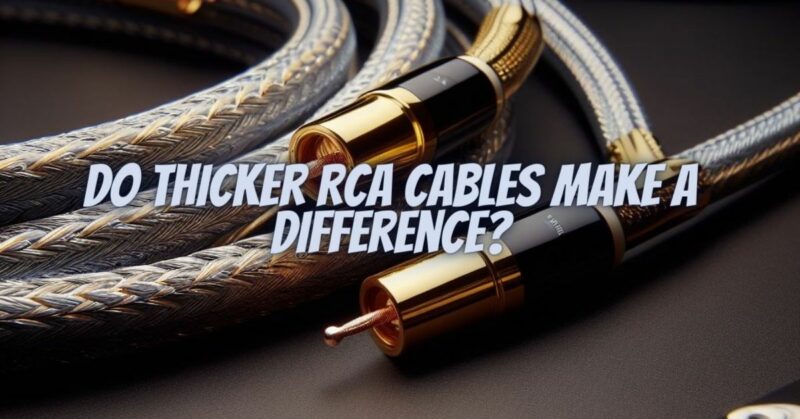The thickness of RCA cables is often used as a measure of their quality. Thicker cables are typically made with more copper, which is a better conductor of electricity than other materials. This can lead to better sound quality, as thicker cables can reduce resistance and distortion.
However, it is important to note that the thickness of an RCA cable is not the only factor that affects its sound quality. Other factors such as the shielding and connectors also play a role.
How do thicker RCA cables affect sound quality?
Thicker RCA cables can affect sound quality in a number of ways. First, they can reduce resistance. Resistance is the opposition to the flow of electrical current. When an audio signal travels through an RCA cable with high resistance, it can become distorted. Thicker RCA cables have lower resistance, which can help to reduce distortion.
Second, thicker RCA cables can improve shielding. Shielding is a layer of metal or foil that protects the cable from external interference. External interference can cause noise and distortion in the audio signal. Thicker RCA cables typically have better shielding, which can help to reduce noise and distortion.
Third, thicker RCA cables can improve the frequency response of your audio system. Frequency response is the range of frequencies that your audio system can reproduce. Thicker RCA cables can help to improve the frequency response of your system by reducing the attenuation of high frequencies.
Do thicker RCA cables always sound better?
No, thicker RCA cables do not always sound better. Other factors such as the shielding and connectors also play a role in sound quality. Additionally, the quality of your audio system will also affect the sound quality. If you have a low-quality audio system, then you are likely not to hear a noticeable difference in sound quality between thick and thin RCA cables.
Is it worth buying thicker RCA cables?
Whether or not it is worth buying thicker RCA cables depends on your individual needs and budget. If you have a high-end audio system and you are serious about getting the best possible sound quality, then it may be worth investing in thicker RCA cables. However, if you have a more modest audio system, or if you are not as sensitive to sound quality, then you may be perfectly happy with thinner RCA cables.
The best way to decide whether or not thicker RCA cables are worth the extra cost is to try them out for yourself and see if you can hear a difference.
Tips for choosing RCA cables
Here are a few tips for choosing RCA cables:
- Match the impedance: The impedance of the RCA cable should match the impedance of the source and destination devices. This will ensure optimal signal transfer and sound quality.
- Choose the right type of cable: There are two main types of RCA cables: shielded and unshielded. Shielded cables are more expensive, but they offer better protection from noise and interference. Unshielded cables are less expensive, but they are more susceptible to noise and interference.
- Read reviews: Before you buy RCA cables, read reviews from other audiophiles to get their opinions on different brands and models. This can help you narrow down your choices and choose the best cables for your needs.
Thicker RCA cables can offer a number of benefits, including reduced resistance, improved shielding, and better frequency response. However, it is important to note that the thickness of an RCA cable is not the only factor that affects its sound quality. Other factors such as the shielding and connectors also play a role.
Whether or not it is worth buying thicker RCA cables depends on your individual needs and budget. If you have a high-end audio system and you are serious about getting the best possible sound quality, then it may be worth investing in thicker RCA cables. However, if you have a more modest audio system, or if you are not as sensitive to sound quality, then you may be perfectly happy with thinner RCA cables.


